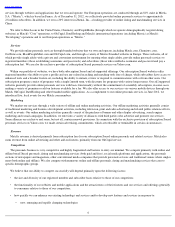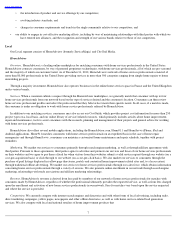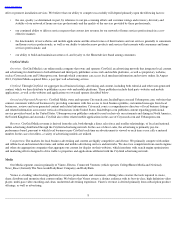ServiceMagic 2012 Annual Report Download - page 19
Download and view the complete annual report
Please find page 19 of the 2012 ServiceMagic annual report below. You can navigate through the pages in the report by either clicking on the pages listed below, or by using the keyword search tool below to find specific information within the annual report.
Table of Contents
and related technologies. Laws that do reference the internet are being interpreted by the courts, but their applicability and scope remain
uncertain.
For example, through our various businesses we post and link to third party content, including third party advertisements, links and
websites, as well as content submitted by users, such as comments, photographs and videos. We could be subject to liability for posting or
linking to third party content, and while we generally require third parties to indemnify us for related claims, we may not be able to enforce our
indemnification rights. Some laws, including the Communications Decency Act, or CDA, and the Digital Millennium Copyright Act, or DMCA,
limit our liability for posting or linking to third party content. For example, the DMCA generally protects online service providers from claims of
copyright infringement based on use of third party content, so long as certain statutory requirements are satisfied. However, the scope and
applicability of the DMCA are subject to judicial interpretation and, as such, remain uncertain, and the U.S. Congress may enact legislation
limiting the protections afforded by the DMCA to online service providers. Moreover, similar protections may not exist in other jurisdictions in
which our various businesses operate. As a result, claims could be threatened and filed under both U.S. and foreign laws based upon use of third
party content asserting, among other things, defamation, invasion of privacy or right or publicity, copyright infringement or trademark
infringement.
Any failure on our part to comply with applicable laws may subject us to additional liabilities, which could adversely affect our business,
financial condition and results of operations. In addition, if the laws to which we are currently subject are amended or interpreted adversely to
our interests, or if new adverse laws are adopted, our products and services might need to be modified to comply with such laws, which would
increase our costs and could result in decreased demand for our products and services to the extent that we pass on such costs to our customers.
Specifically, in the case of tax laws, positions that we have taken or will take are subject to interpretation by the relevant taxing authorities.
While we believe that the positions we have taken to date comply with applicable law, there can be no assurances that the relevant taxing
authorities will not take a contrary position, and if so, that such positions will not adversely affect us. Any events of this nature could adversely
affect our business, financial condition and results of operations.
We may fail to adequately protect our intellectual property rights or may be accused of infringing the intellectual property rights of third
parties.
We regard our intellectual property rights, including trademarks, domain names, trade secrets, patents, copyrights and other similar
intellectual property, as critical to our success. For example, the businesses within our principal reporting segments (Search & Applications,
Match and Local) rely heavily upon their trademarks (primarily Ask.com and Dictionary.com, our various toolbar brands, Match.com,
OkCupid.com, Meetic.com and HomeAdvisor.com and related domain names and logos), through which they market their products and services
and seek to build and maintain brand loyalty and recognition. So long as these businesses continue to use these trademarks to identify their
products and services and renew trademark registrations as required, they will continue to enjoy trademark protection indefinitely under current
laws, rules and regulations.
The businesses within our Search & Applications segment also rely upon trade secrets, including algorithms for the generation, organization
and presentation of search results. To a lesser extent, these businesses also rely upon patented and patent1pending proprietary technologies and
processes, primarily those relating to search1related products and services, with expiration dates for patented technologies ranging from 2017 to
2027, and copyrighted material, primarily emoticons, characters and other content that is incorporated into, and used in connection with the
marketing of, toolbars generally.
Our Match segment also relies upon trade secrets and certain patent1pending proprietary technologies relating to matching process systems
and related features, products and services. HomeAdvisor also relies heavily upon trade secrets, primarily the matching algorithm through which
members of its network of home services professionals are matched with consumers, as well as related patented proprietary technologies that
expire in 2020.
We rely on a combination of laws and contractual restrictions with employees, customers, suppliers, affiliates and others to establish and
protect our various intellectual property rights. For example, we have generally registered and continue to apply to register and renew, or secure
by contract where appropriate, trademarks and service marks as they are developed and used, and reserve, register and renew domain names as
we deem appropriate. Effective trademark protection may not be available or may not be sought in every country in which products and services
are made available and contractual disputes may affect the use of marks governed by private contract. Similarly, not every variation of a domain
name may be available or be registered, even if available.
We also generally seek to apply for patents or for other similar statutory protections as and if we deem appropriate, based on then current
facts and circumstances, and will continue to do so in the future. No assurances can be given that any patent application we have filed will result
in a patent being issued, or that any existing or future patents will afford adequate
16
























